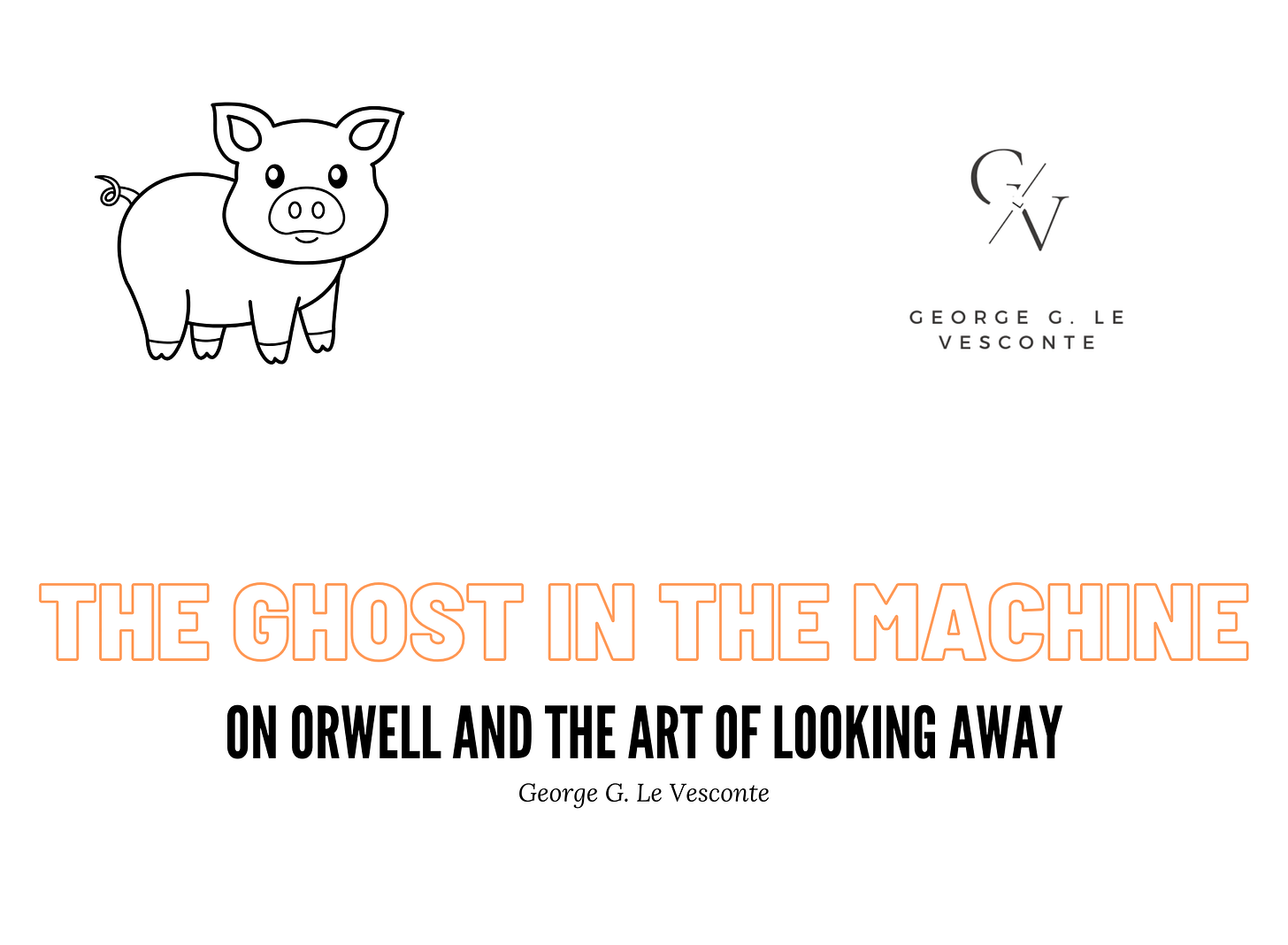The Ghost in the Machine: on Orwell and the Art of Looking Away
Part I of II.
There is a particular kind of haunting reserved for books that were meant as warnings but have become, instead, something akin to instruction manuals. To read George Orwell in the 21st century is to feel this haunting acutely. It is not the thrill of dystopian fiction; it is the quiet, sinking feeling of looking at a photograph of a grandparent and seeing your own reflection staring back. The features are unmistakable.
Orwell, a man who saw the twin horrors of fascism and Stalinism devour Europe, was not a prophet. He was a diagnostician. In the ink-black dread of Nineteen Eighty-Four and the grim allegory of Animal Farm, he was not predicting a fantastical future so much as mapping the pathology of power he saw flourishing in his present. His great, enduring warning was not merely about a single authoritarian figure, a ‘Big Brother’ on a poster. It was about the subtle, creeping erosion of the very concept of truth, and the mechanisms by which a society could be convinced to participate in its own deception.
His central message was a triangulation of control. First, you control the past. The Ministry of Truth, in its chillingly banal efficiency, was not just destroying history; it was manufacturing it on a rolling basis. ‘Who controls the past,’ ran the Party slogan, ‘controls the future: who controls the present controls the past.’ This wasn’t about burning books, a crude and public act. It was about the silent, constant alteration of the digital record, the quiet rewriting of yesterday’s news, the memory-holing of inconvenient facts until objective reality becomes a fluid, unreliable thing.
Second, you control the language. In his blistering essay, Politics and the English Language, Orwell railed against the ‘inflated style’ and ‘sheer cloudy vagueness’ of political speech. This was an intellectual groundwork for Newspeak. The ultimate aim of Newspeak, of course, was not just to prevent heresy but to make heresy impossible by narrowing the range of thought. If there is no word for freedom, can you truly conceive of it? It’s a principle we see echoed in the curated vocabularies of modern political discourse, where ‘enhanced interrogation’ sanitises torture and ‘alternative facts’ attempt to legitimise falsehoods. Language is bent into an instrument not of illumination, but of obfuscation.
And third, through these methods, you control thought itself. The telescreen, with its omnipresent gaze, was Orwell’s most famous invention, but perhaps his most insidious was ‘doublethink’—the act of holding two contradictory beliefs simultaneously and accepting both. It is the mental gymnastics required to accept war as an instrument of peace, to see surveillance as a guarantor of liberty, to believe a lie one knows to be a lie. It is the final surrender of the inner self.
Here is the rub, the great and terrible irony. We saw the warnings. We read the books, nodded gravely in literature class, and popularised the term ‘Orwellian’ to describe any act of state overreach. We were, it seemed, inoculated. And yet, we failed to heed the diagnosis.
We did not get the jackbooted thugs and the drab, grey uniforms of Airstrip One. The dystopia that arrived did so in disguise, dressed in the livery of convenience and connectivity. We willingly placed the telescreens in our own homes and, more intimately, in our own pockets, offering up our data not to a menacing state but to smiling corporations for the price of a better user experience. The surveillance became participatory.
The degradation of language happened not entirely by state decree, but through the torrential, context-free flow of information online, where outrage is the currency and nuance is a liability. We are not forced to accept doublethink; we are nudged towards it by algorithms that cocoon us in realities of our own making, where contradictory ideas don’t need to be reconciled because inconvenient truths are never allowed to penetrate the bubble. The memory hole is no longer a chute in a government building; it’s the endless scroll of a social media feed, where yesterday’s atrocity is buried by today’s meme.
Orwell’s fear was that we would be deprived of information. The reality, as thinkers like Aldous Huxley also posited, is that we are being drowned in it, rendered passive and important by a surplus of trivia and spectacle. The ultimate tragedy may be that we have not been conquered by an external force, but have instead willingly ceded the territory Orwell begged us to defend. We have looked at the apparatus of control—the surveillance, the linguistic decay, the assault on objective history—and we have, for the most part, found it easier to look away.
His warning was never about a specific year on the calendar. It was about a state of mind, a societal condition. The ghost of his work doesn’t just haunt our corridors of power; it sits with us as we scroll, as we share, as we accept. It asks a quiet, persistent question: at what point does a warning, unheeded, simply become a description of the world as it is?


